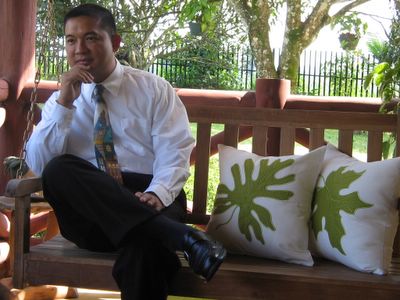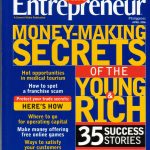Entrepreneur Magazine: From the Office to the Farm
At 36, Jose Feron “Dodong” Cacanando was on his way to corporate success as assistant country manager of Hewlett-Packard Philippines. “I enjoyed my job because I was excelling at it. My goal then was to become general manager of Hewlett-Packard. They told me that I was number 3 in the succession plan,” said the affable electronic engineer. In 1997, however, he felt a growing sense of uneasiness, making him wonder if he should be doing something else. It escalated during a 3-month stint that had him traveling in and out of the country. “I couldn’t breathe because of the tension. So I asked myself, ‘Pag magkasakit ba ako, ano ang gagawin nung company? Of course, they would send me to the hospital. Pag hindi ako maka-recover, ano ang gagawin ng kompanya? They are going to replace me.’ And then, I developed a burden to spend time with my family. I told God I was willing to give up my career,” he shares.
A spiritual person, Cacanando asked providence for signs that it was time to leave his job. “I wanted miraculous signs. If God wanted me to resign, let Him give me a very good performance that fiscal year, so that they won’t think I’m abandoning the company. Second, don’t promote me even if I’m up for promotion, because I would be tempted to stay. Finally, give me four months’ worth of salary so that I would have money to look for a business,” he recalls. The odds of those things happening would be next to impossible, he surmised. The Asian economic crisis had badly affected the company’s performance, making it lag behind in its quota. “We only had $58,000 in sales near the end of that fiscal year. That’s so far from our $1 million quota,” he stresses. Four days before the fiscal year ended, however, the office fax machine started churning up purchase orders. That year, they didn’t only beat the $1 million sales quota, they exceeded it by another million. In spite of that, Cacanando didn’t get his promotion, but landed a bonus that was equivalent to four month’s worth of salary. He knew it was time to move.
Photo: Dodong Cacanando at his country home in Bukidnon
(2-28-06)
Cacanando dreamt of living a simple life in a farm. “It meant I can spend time with my family. It meant I can have time with God. Yun lang yon,” he shares. Having minimal assets, he thought of relocating his family to Mindanao where the cost of living is relatively lower. One weekend, Cacando brought his wife Peachy and their two children to Cagayan de Oro. They took a side trip to two farms in Bukidnon, an hour’s drive from Cagayan de Oro city. His wife and two children fell in love with the place. Cacandando’s wife grew up in Manila and had worked as an interior designer in New York, for her to want to relocate to a remote province was a miracle in itself. Cacanando took that as another sign.
When the family got home, Cacanando submitted his resignation letter. Two months later, he called up Monterey to ask about the possibility of being a hog contract grower. “While the concept is nice to go contract growing, it was very expensive. The farm would cost P12M. The income was smaller, pero sigurado yan, kasi total may mag-mamarket sa yo. Magpapalaki lang naman ako ng baboy eh,” he explains. Monterery told him that it usually took eight months to look for land and four months to get a business permit. Since he had no relatives or contacts in Bukidnon and only had four months’ worth of salary, Cacanando felt he didn’t stand a chance of finding a site for the piggery. He went home discouraged and spent two weeks praying about his next step.
After two weeks, Monterey called him up to say that a prospective contract grower had pulled out and was selling his 14-hectare land for P1million. The property was located at the foot of Mt. Kintanglad and although there was no infrastructure yet, the owner had already drawn up a plan for roads and electricity. “Mahal kung lupa lang, kasi wala pa namang infrastructure eh. Plano lang, kaya lang it meant business for us, When I asked him, ‘When did you start to look for the land?’ You know, it was the time when God told me to leave my job. Parang pinahanap sa kanya ng Diyos yung lupa, tapos binigay sa amin,” he shares. Cacanando borrowed P8 million from relatives. He got the rest of the capital from the proceeds of the sale of his house in Parañaque.
When he relocated his family to Bukidnon on Oct 1998, Cacanando had to start from scratch. Since all his money went to the construction of the farm, the family had to live in a 20-footer container van, which they had used to haul their belongings. When Moriah Farms started operations in February 1999, he only had P1,000 in the bank. “Our container van home is special to us, because it taught us to simplify our life. In everything that we do now, we’ve learned to bring down the cost,” Cacanando says.

Photo: Dodong, his wife Peachy and the author taken by Jun Pinzon (2-28-06)
During the first month, the 3,000 pigs in the farm earned him P100,000, which he quickly put back into the business. Income was small but steady and Cacanando was content. He admits, though, that it took a big shift in mindset for him. “My biggest struggle was cash management. Because in Hewlett-Packard, I had salary, I could spend as I pleased. You cannot do that in business. It took me four years to unlearn that,” he rues.
Since he felt that this new venture was providential, Cacanando wanted to run it God’s way. He began using the Bible as a tool for improving his business. “I read the Bible not to be spiritual but to learn how I should do things. The Bible tells us that God has given us everything and that we are just stewards. If God has given me everything I need, then I should not waste anything. Dapat wala akong sayangin, maski yung manure ng baboy,”Cacando, now 43, explains. He implemented a “no waste” policy in the farm and started a project with pig manure. “Ang baboy ang problema niyan, waste niya eh. Karamihan ng babuyan dito may kaso with DENR. Kasi nagsispill-over sa water system,” he says. Since the piggery took up only six of the 14-hectare property, he began dumping hog’s waste on the remaining land, using it as fertilizer. This not only took care of hygiene in the farm, it also gave birth to a business more profitable than the piggery—vegetable farming.
Photo: Dodong and the author at the lettuce farm (3-1-06)
The first crops he planted were carrots. He found that farming is not as easy as it looks. His first harvest yielded thumb-sized carrots. Having limited income, Cacanando scoured old bookshops for second-hand books. “Farming pala is complicated. You don’t just plant and then it grows. You have to work the soil. You have to put a lot of fiber in the soil. Hindi lang siya compost. Kailangan may fiber siya. Dapat may tinatawag na calcium siya,” he says. After a few hits and misses, Cacanando eventually came up with high-quality yields, prompting the Department of Agriculture to ask him to teach them how to plant carrots.
In the year 2000, a neighbor suggested that Cacanando harvest lettuce. Not knowing anything about growing lettuce, Cacanando hesitated at first, but gave it a try to appease the neighbor. To his big surprise, his farm yielded lettuces weighing 1-kilo each. “Pag dinadala namin sa traders, tinatanong nila, ‘Ano yan cabbage?’ It was the first time they saw lettuce this big. I learned later that lettuce is one of the hardest crops to grow. The reason we stuck with it is it is easy for us. Feeling ko bigay ng Diyos,” he humbly says. Unbeknownst to him at that time, the location of his farm was perfect for growing the said vegetable. “What’s special about our place is we’re positioned below a mountain. Meron akong kaibigang farmer, pareho ang elevation ng farm namin, pero malayo siya sa bundok. He cannot grow lettuce whole year round. Kami we can, because of our location,” he explains. Cacanando started marketing the vegetables to traders in nearby Cagayan de Oro City at a volume of 250 kilos per week. The lettuce, consisting of four varieties (iceberg, green coral, red coral and romaine), would sell from P65 to P105 per kilo.
Wanting to come up a better yield at a lower cost, he continued to improve the nutrition of his vegetables. He put his background in engineering to good use and optimized systems in the farm. “We’re very competitive in pricing. I want to be the best and I want to be the cheapest in my category. I want persistent profit throughout the year, so maski konti lang ang kita, basta parati. What the customers do, they give us bigger volume. Totoo may mas mura kesa sa amin, but we’re the most consistent in quality,” Cacanando explains.
Through the prompting of a friend, Cacanando sent 10 kilos of his prized lettuce to one of the processors of Mcdonald’s in 2001. He quickly became one of the ten suppliers of Mcdonald’s, shipping 500 kilos to Manila weekly. When Mcdonald’s quality control manager Carol Banad visited the farm in 2002, she offered to send Cacanando on a lettuce convention in Australia. After that trip, he was informed that Moriah Farms had been chosen as Mcdonald’s preferred supplier. From 500 kilos of lettuce, the company wanted him to supply 3.5 tons weekly. “Normally, you look for the market, then you work for quality. Sa amin, we worked on our quality first. The market will just come when they hear about it,” he explains. In 2002, Kentucky Fried Chicken also became a client.
Photo: World-class lettuce from the Philippines (3-1-06)
Today Moriah Farms is one of the biggest suppliers of lettuce in the country, with an output of 7 tons per week. Its produce has been chosen as one of the best in Asia in terms of taste, texture and color. “The lettuce would be sent to HK for grading. There have been occasions when our lettuce was graded 3, the perfect score,” he proudly says.
From thirty farm hands in 1999, Cacanando’s staff has grown to seventy. Part of their training is a weekly Bible study that Cacanando says has been instrumental in decreasing incidences of conflict and theft. “To me in business, one of the biggest pain is people management—away, nagyayabangan, intriga, tsismis. Because of the Bible study, we would share the same values. It helped us improve on our system. In fact, it helped us save on money. Ang security guard ko sa farm na 70 ang tao, isa lang. I don’t need to hire more managers. My people watch each other,” he says. As they tackled topics like stewardship and dignity of labor, Cacanando also noticed that these sessions boosted the morale of his people, thereby increasing productivity in the farm. He is most proud of his farm managers, most of whom had very little education, but runs the farm like a seasoned managers and agriculturists. Other businessmen and corporations have taken notice and are asking him to train their staff. This prompted Cacanando to put up Semilya sa Kinabuhi (Seed of Life), a non-profit training facility that marries business and biblical principles.
It’s been seven years since Cacanando left the corporate world, and he has no regrets. His farm, which has expanded to 19 hectares, is earning Cacanando a substantial amount in millions, allowing his family to live comfortably. His investment in the hog farm has not yet been recouped, but the earnings from the lettuce farm has more than made up for it. This year he and his managers are targeting to increase their output to 10 tons per week.
Looking back, Cacanando is grateful he developed the habit of living frugally and keeping out of debt. “I believe in growing a business. Start small. Makakatipid ka sa detalye. When you’re forced to grow from small, yung internal learning, malakas masyado. Kaya yung aking farm manager, grade 5 lang ang natapos, ang galing-gaing, because we went through all the pain of trying to understand with very little money. When you have a lot of money, you don’t think of that, you buy the solution,” he shares. Case in point: Some years back, he needed a manure dryer that would set him back P800,000, but since he didn’t have the money and his wife didn’t want him to borrow, he and his managers were able to design a manual dryer using bamboo slats, costing him only P80,000.
It is this philosophy that has made his business thrive through the hard times. The market, in recent years, has been bad. Most of his competitors have shut down operations. “They even have Australian and Israeli consultants, but they closed down because they have big debts. The reason why we are still here is number one, God is sustaining us. Number two, wala kaming utang,” the happy farmer ends.
-Written by Jennifer Yap Caspe
for Entrepreneur Magazine, May 2006 issue






 Jenn C.
God-lover.
Milk & TV Producer.
Writer.
Entrepreneur. Natural Health Advocate.
Jenn C.
God-lover.
Milk & TV Producer.
Writer.
Entrepreneur. Natural Health Advocate.






hey JennyÜ i love the way you write and i want you to edit and write with me a book one day. Sa iyo lkahat ang royalty, hahahaha.. (michael)
hi jen. i’m jay, from davao. i’ve met dodong thru our regular values formation sessions in our office. i’d like to repost this blog thru my wordpress blog site. you can check it out – http://sanctuaryofmyreflections.wordpress.com
i love your work. 🙂 God bless.
hi jenny…i’m maricon cacanando from agoo, La Union…
when i came to read this.,..
whoa! i became really proud of my surname…
Hi Jenny,
I’m Jeff from Cagayan de Oro. I met Dodong once in launching of a housing subdivision project of one of his friends in Bukidnon-Cagayan de Oro area. He was tasked to give a message from the Bible and lead in a prayer of dedication. I could feel the anointing while he was talking.
I have heard of him long before that moment. I was the program organizer of that event. I even wrote his name on the script for the emcee but I didn’t know it was him. I only realized it was the Jose Cacanando that I have always wanted to meet after several days. I haven’t seen him again after that.
But just this morning, while riding on jeepney on my way to office his name came to my mind. Upon reaching the office, I immediately “googled” his name. I hope to meet him sometime. I’ll make a confession: I am wishing to be mentored by him.
Thank you and God bless you
Hi. was searching for my fav pamangkin and accidentally saw this HOP website.
He is my pamangkin and he was growing up with our constant care and love as an only son i helped him fly his skinny kite and riding on a bamboo pole as his horse.
im proud to see and read of what he is now..
Im his mother 7th sibling and been living here in japan for almost 35 years. just say hi to him from me..
Hello, madame! 🙂 Yes, I will tell Mr. Dodong that you said hi. God bless!
Hi, Jenny! We’ll be having a 1-day session with Sir Dodong on Dec 11. Would like to ask if we could use your article in our fyers? We shall have a notation that the article was written by you. Thanks for the reply. God bless!